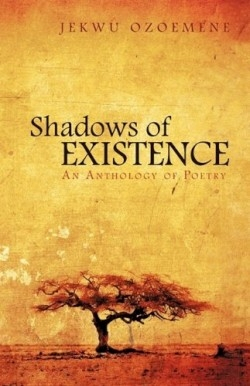Shadows of Existence
An Anthology of Poetry
Jekwu Ozoemene’s poetry collection, Shadows of Existence, is one with something to say. Here, the poet touches on everything from gender and abuse to poverty and consumerism. These poems focus on the African continent and on a culture that is as unique as it is problematic. Like a badge on a uniform, this poet’s politics are as loud and proud as the poem’s layered rhyme schemes and rich imagery.
The persona poems in this collection are often the most memorable. They give the marginalized and often silenced members of society the chance to speak. Ozoemene is able to capture the unique voices of his culture’s characters. In “Morning after the Wedding,” he nails the voice of a young girl married off to “cheap blenders / throw pillows” and a “snoring snorting man.” The unique insights of this character paired with the rich refrain of “Mama said I must get married now” makes this girl’s cry for help certainly memorable.
Ozoemene has a gift for description. When it comes to describing action, his lines are sharp. For example, in “Pyrrhic War,” the poet writes, “You have seen my steel / Icy cold molten fire / Curvy scimitar of gold and sapphire / Carving/slicing through the front lines.” The sharp descriptions mirror the intensity of this journey and fight. The language in this poem is successful because it is as precise as the scimitar’s edge.
The less polished poems in the book focus too strongly on the thesis or main message of the pieces rather than the language. The poems here become something more like speeches, and they yell more than sing. For example, in “Learned Helplessness,” Ozoemene writes, “In our patriarchal society, across social class, religion, or colour / Traditional belief holds that husbands own their wives (lock, stock, and / barrel).” Adding the thesis-like explanation dulls the edge of the poem. Without it, the woman’s story and pleas would be more than enough to carry the message across to the reader.
When Ozoemene pulls back his lens, the result is often metaphorically rich. For example, in “As the Walls Come Crumbling Down,” Ozoemene describes how “The sound of the tiny raindrops fall / Pity-Pata! Pity-Pata! A dirge of wasted matter.” Here, the onomatopoeia of the rain’s descriptions and the subtle comparison to wasted matter relate back to the critiques of culture at the heart of the book’s poems.
This is a book for readers who want bold yet easy-to-understand poems about a truly unique culture. For better or for worse, Ozoemene is a poet who wears his heart on his sleeve. The rough-around-the-edges honesty of these pieces makes them that much more honest and endearing. More than a death march, these poems are a rallying cry to an unchanged nation in need of updating. To take on bigotry and prejudice is no easy feat. And yet, Ozoemene does not flinch.
Disclosure: This article is not an endorsement, but a review. The publisher of this book provided free copies of the book and paid a small fee to have their book reviewed by a professional reviewer. Foreword Reviews and Clarion Reviews make no guarantee that the publisher will receive a positive review. Foreword Magazine, Inc. is disclosing this in accordance with the Federal Trade Commission’s 16 CFR, Part 255.

